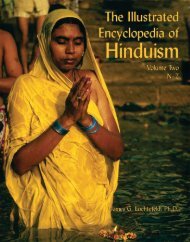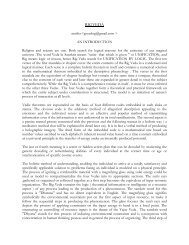The Illustrated Encyclopedia of Hindusim vol 2
You also want an ePaper? Increase the reach of your titles
YUMPU automatically turns print PDFs into web optimized ePapers that Google loves.
Tuesday<br />
712<br />
Tryambakeshvar in the form <strong>of</strong> a linga,<br />
the pillar-shaped image that is his symbolic<br />
form. <strong>The</strong> Tryambakeshvar linga is<br />
one <strong>of</strong> the twelve jyotirlingas, a network<br />
<strong>of</strong> sites deemed especially sacred to<br />
Shiva and at which Shiva is uniquely<br />
present. <strong>The</strong> charter myth for<br />
Tryambakeshvar begins with the sage<br />
Gautama, who unwisely hits an old cow<br />
with a stick, killing it, and thus incurs<br />
the sin <strong>of</strong> cow slaughter. Gautama is told<br />
that to expiate his sin, he first has to<br />
amass enough merit to bring the Ganges<br />
down to earth, and after he has purified<br />
himself by bathing (snana) in the<br />
Ganges, he has to make and worship 10<br />
million Shiva lingas formed from the<br />
sand on its banks. Gautama undertakes<br />
his penance (prayashchitta) diligently.<br />
Upon worshiping the 10 millionth linga<br />
he is rewarded by a vision <strong>of</strong> Shiva, who<br />
grants his wish that both the Ganges and<br />
Shiva will remain there forever—the former<br />
in her form as the Godavari, the latter<br />
as Tryambakeshvar.<br />
Tuesday<br />
(Mangalvar) <strong>The</strong> third day <strong>of</strong> the week,<br />
presided over by the planet Mars<br />
(Mangal). <strong>The</strong> planet Mars is deemed<br />
inauspicious, both because <strong>of</strong> its red<br />
color (reminiscent <strong>of</strong> blood) and<br />
because <strong>of</strong> its associations with war and<br />
disorder. Tuesday is widely considered<br />
an unlucky day, and many people<br />
abstain from certain kinds <strong>of</strong> activity on<br />
it. Travel is particularly discouraged<br />
unless absolutely necessary. Cutting the<br />
hair and beard is also discouraged, and<br />
in much <strong>of</strong> northern India, barbers take<br />
Tuesday <strong>of</strong>f. To counter the day’s potential<br />
inauspiciousness, many people also<br />
perform rites <strong>of</strong> protection, such as<br />
worshiping strong protective deities<br />
such as Hanuman—who is close<br />
enough to human beings to understand<br />
the problems they face, but divine<br />
enough to be able to protect them.<br />
Paradoxically, the literal meaning <strong>of</strong> the<br />
name for Tuesday is the “auspicious”<br />
(mangal) day. Giving it this euphemistic<br />
name may simply be a bit <strong>of</strong> reverse<br />
magic; that if one calls it the lucky day, it<br />
may, in fact, turn out to be.<br />
Tukaram<br />
(1598–1650) Poet and saint in the<br />
Varkari Panth, a religious community<br />
centered on the worship <strong>of</strong> the god<br />
Vithoba, at his temple at Pandharpur in<br />
the modern state <strong>of</strong> Maharashtra.<br />
According to tradition, Tukaram was a<br />
shudra (in traditional Hinduism, there<br />
are four main social groups, the shudras<br />
being the lowest and least influential)<br />
born in the small village <strong>of</strong> Dehu, where<br />
his father was a petty merchant.<br />
Tukaram continued in the family business,<br />
which eventually failed because he<br />
had little interest in worldly life. He<br />
longed instead for the life <strong>of</strong> a renunciant,<br />
in which he could completely<br />
devote himself to God. As with many <strong>of</strong><br />
the other bhakti saints, he is reported to<br />
have suffered considerable persecution<br />
by traditionally minded brahmins, who<br />
were uneasy about a person <strong>of</strong> his low<br />
status gaining spiritual greatness. An<br />
unlettered man, he is most famous for<br />
the songs known as abhangs, which are<br />
still widely sung in Maharashtra. He had<br />
many disciples, including the poet-saint<br />
Bahina Bai, and according to tradition,<br />
he ended his life by being taken up to<br />
heaven in a chariot <strong>of</strong> fire. For further<br />
information see G. A. Deleury, <strong>The</strong> Cult<br />
<strong>of</strong> Vithoba,1960; and Justin E. Abbott<br />
(trans.), <strong>The</strong> Life <strong>of</strong> Tukaram, 1980.<br />
Tulsi<br />
A small shrublike plant commonly<br />
denoted the “holy basil.” For devotees<br />
(bhakta) <strong>of</strong> the god Vishnu, the tulsi<br />
plant is a form <strong>of</strong> Vishnu’s wife Lakshmi,<br />
who is cursed to take birth as a plant.<br />
According to the story, Lakshmi sits with<br />
Vishnu’s wives, the goddesses Ganga<br />
and Saraswati. Ganga makes amorous<br />
eyes at Vishnu, and when Saraswati<br />
protests this indecency, a quarrel breaks<br />
out. By the time it is over, Ganga and<br />
Saraswati have cursed each other to be<br />
born on earth as rivers. Vishnu has been

















